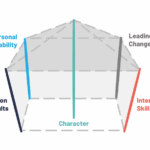When is the last time you removed “should” and replaced it with “want” while trying to make a tough decision? The results can be transformative.
Many questions in life have fairly straight-forward, accepted “right” answers. Questions like: Should I apologize for doing something wrong? Or, should I say “thank you” and “please”? These are pretty clear-cut, right vs. wrong examples.
What happens when we assume we can apply this same black and white logic to life’s more difficult questions? The questions that live in the gray? The questions that speak to your heart, desires, and who you are as a person?
These, at least for me, are the types of questions that can feel overwhelming. As a person who relies on data, and weighing good/better/best alternatives, the questions without a “best” alternative defy logic and reason. And keep me up at night.
How do we make a decision in these situations?
Philosopher Ruth Chang, in her TED Talk on How To Make Hard Choices said the following:
“When we face hard choices, we shouldn’t beat our head against a wall trying to figure out which alternative is better. There is no best alternative. Instead of looking for reasons ‘out there’ we should be looking for reasons ‘in here.’ [Ask yourself] who am I to be?”
An essential key to making that shift is to subtly change the question or problem we are trying to solve. Take a step back and notice how often the question you’re grappling with involves the word should. “What should I do? What should I want?” The emphasis in those questions is not about you – it’s about what others might want or think. It’s reactionary rather than proactive.
What if you replaced should with want? When is the last time you really asked yourself, “What do I want?”
When you shift the focus of the question, it uncovers the longer-term benefits and consequences of your decisions. And, with that, comes more clarity around alignment with your core values and life priorities, and a path to your decision.
With even the slightest glimmer of clarity there is also the fundamental guidance of: Choose and commit. For those of us who tend to over-think, or have perfectionist syndrome, this is easier said than done. But, remember, life isn’t black and white. We might make mistakes, and we learn from them. In the meantime, stop the self-induced stress and just choose!







